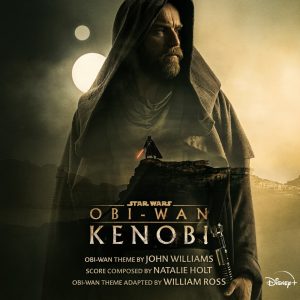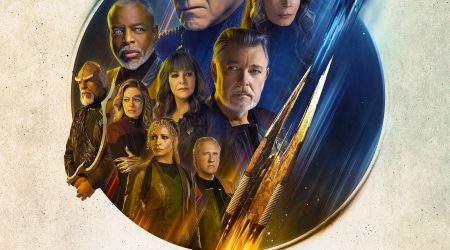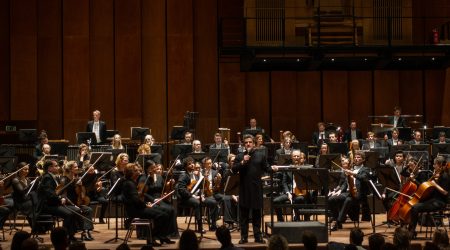Concerning spoilers: I avoided mentioning story plots in this review, but I have to address some concepts which you may not want to know.

Disney has been recently quite successful with television shows on their own streaming platform Disney+, which is not a big surprise with all the popular franchises they own, including Star Wars. After The Mandalorian and The Book of Boba Fett, it was time for Disney to revisit characters from the Skywalker saga with the show Obi-Wan Kenobi. This show tells the story of the famous Star Wars characters Obi-Wan Kenobi and Darth Vader, after the events of Revenge of the Sith, with actors Ewan McGregor and Hayden Christensen reprising their roles.
Many Star Wars fans were waiting impatiently for this new show to see how the story unfold, but film music fans were joining them as well in the wait when the announcement came that John Williams would be writing the main theme for Obi-Wan. The Jedi knight was introduced in 1977, but he never received his own official theme by Williams. After over forty years, fans could finally hear what kind of melody Williams had in mind for this iconic Star Wars figure.
Since Williams only provided the main theme, the soundtrack itself needed to be written by someone else. That assignment was divided between Natalie Holt for writing the overall score and William Ross for the parts where John Williams’ themes needed to be integrated into the music. If you are unfamiliar with Ross, he has collaborated with Williams on many scores, including Star Wars and Harry Potter. He has been an orchestrator on many very well-received scores, including Robin Hood: Prince of Thieves, Beauty and the Beast, Forrest Gump, The Matrix Reloaded, Captain America: The First Avenger and many more.
As an admirer of Star Wars and John Williams, I must discuss the main theme first. It can be heard in “Obi-Wan,” and it is the only track on the album credited to John Williams. It should not be a big surprise that the theme is brilliant. The melody starts on a French Horn and, like his themes for Leia and Yoda, it sounds calm and soothing, but there is also a bit of sadness. After the French horn part, you can hear a series of ostinati building up, which is an integral part of the theme. After it, Williams keeps playing with the theme’s melody until a massive-sounding orchestral finale contains the theme’s melody. The cue is stunning and shows the superb skill of the now 90-year-old composer.
The theme appears on multiple occasions in the show, and many versions can be found in different tracks, all credited to William Ross. One of the highlights is “End Credit,” in which you can hear an excellent alternative version of the theme, with a bit more focus on sounding more heroic than sad. The music in other tracks by Ross sound like what you can expect from a Star Wars show that has ties with the original movies: integrating John Williams’ themes in pure orchestral music. In “The Journey Begins,” for example, the main Obi-Wan theme sounds sad and ominous. “Overcoming the Past” is a cue that Ross has written that does not really contain the main theme but is a massive emotional-sounding orchestral piece, together with a choir, that ends in The Imperial March as the finale. “Saying Goodbye” is another highlight and a gorgeous homage to John Williams’ themes. Not only can the new Obi-Wan theme be heard, but you can also listen to the original Princess Leia theme and the Force theme, which shows wonderfully how the new Obi-Wan theme fits with the original Star Wars music from the movies.
Holt’s music is quite different from William Ross’. As can be read in interviews, Holt started writing for the show before Williams and Ross got involved, and it was uncertain if she could reuse existing Star Wars themes. Her musical approach was more focused on the scenery, mood and emotions. Where original Star Wars music is orchestral, she opted for different soundscapes. If you listen to “Daiyu” and “Mapuzo,” for example, representing two planets, you can hear diverse instruments and melodies symbolizing the landscapes and the people of those planets.
Her approach to The Dark Side is also very different from the expected iconic melody of The Imperial March. It strongly focuses on bold percussion sounds, low melodies and sounds like a hunting horn, perfectly representing the evil Inquisitors hunting the Jedi. The tracks “Inquisitors’ Hunt,” “Sensing Vader” and “Empire Arrival” are good examples of this musical approach.
Holt opted for more emotional melodic lines for the heroes. She wrote a theme for the young Leia, which can be heard best in “Young Leia,” and it is a beautiful melody. Variations on this theme can be heard in “Days of Alderaan” and “Bail and Leia.” There is also a lot of sadness in the show, and Holt scored it wonderfully by only using the strings, with “Nari’s Shadow,” “Holding Hands” and “Sacrifice” as gorgeous examples.
I think the score for Obi-Wan Kenobi is one of a kind, and I am not sure if that is a good thing in this case. If you listen carefully to Holt’s music, you can hear her vision for the music. On one side, you have Obi-Wan: the troubled man who needs to overcome his doubts to help those in trouble, which can be heard in the music with gorgeous, emotional melodies performed by the strings. On the other side, you have the evil Inquisitors, with Reva and Darth Vader leading them, accompanied by dark sounds and heavy percussion. I can imagine a world in which Holt would have been responsible for the whole score where this would work and be amazing. Still, as it is now, her music is overshadowed by the Ross adaptations that are fully orchestral, making it sound like a traditional Star Wars show. Ross’ music being present at many key moments in the show makes her music feel out of place, and that sounds a bit unfair to me.
I love that we can finally listen to a John Williams theme for Obi-Wan after decades, but I am not sure if it resulted in the best music for the show. As it stands now, the music is divided into two completely different music styles, and the show suffers from it: one of the music styles makes the other feel out of place. A second season is already rumored, making me wonder what Disney will do with the music. In my honest opinion, a choice needs to be made: give the show its own musical identity like it has been done with The Mandalorian, or give it the full traditional, orchestral Star Wars treatment. I am quite curious about what will happen when we see the potential second season of Obi-Wan Kenobi.
Listen or buy
- Buy this soundtrack digitally from Amazon.com or Apple Music
- Listen to this soundtrack on Spotify
Tracklist
The highlights are in bold.
1 John Williams 2 Natalie Holt 3 William Ross
- Obi‐Wan (4:06)1
- Order 66 (1:40)2
- Inquisitors’ Hunt (3:09)2
- Young Leia (1:04)2
- Days of Alderaan (1:38)2
- The Journey Begins (2:57)3
- Bail and Leia (2:19)2
- Nari’s Shadow (1:14)2
- Ready to Go (2:26)2
- Daiyu (2:25)2
- Cat and Mouse (3:10)2
- Spice Den (1:10)2
- First Rescue (3:10)3
- Mapuzo (1:17)2
- The Path (1:35)2
- Sensing Vader (2:49)2
- Parallel Lines (2:12)2
- Some Things Can’t Be Forgotten (4:47)3
- Stormtrooper Patrol (2:34)2
- Hangar Escape (2:33)2
- Hold Hands (1:39)2
- Empire Arrival (2:04)2
- Dark Side Assault (2:37)2
- I Will Do What I Must (2:48)3
- Sacrifice (1:41)2
- No Further Use (3:39)2
- Overcoming the Past (4:28)3
- Tatooine Desert Chase (2:19)2
- Who You Become (3:36)2
- Saying Goodbye (5:26)3
- End Credit (4:02)3
Total length: 1 hour and 22 minutes
Walt Disney Records (2022)




